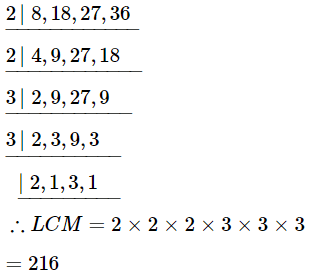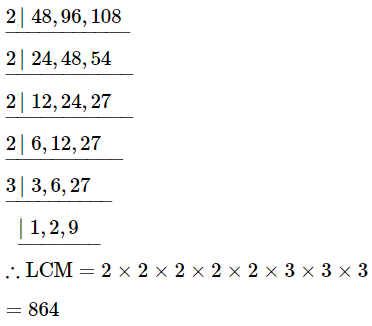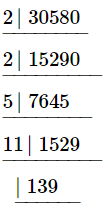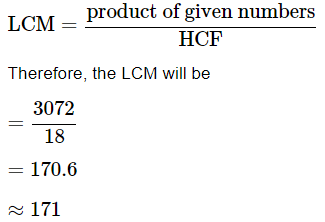Practice Questions: Playing with Numbers | Practice Questions with Solutions for Class 6 PDF Download
Q1: Find LCM of 8, 18, 27, 36 by division method.
Ans: Given: 8, 18, 27, 36
We need to find the LCM of the given numbers using the division method.
LCM stands for least common multiple.
So, LCM of the given numbers will be
Q2: Find the LCM of 48, 96 and 108. by prime factorization method.
Ans: Given: 48,96,108
We need to find the LCM of the given numbers.
LCM stands for least common multiple.
So, LCM of the given numbers will be
Q3: Reduce 279/381 to lowest forms.
Ans: Given: 279/381
We need to reduce the given fraction to its lowest form.
The lowest fraction will be when the numbers do not have common factors other than 1.
Therefore, the reduced form of the given number will be
Q4: Give the prime factorization of 30580.
Ans: Given: 30580
We need to find factors using Prime Factorization.
Therefore, the prime factors will be 2, 2, 5, 11, 139
Q5: The HCF of two numbers is 18 and their product is 3072. Find the LCM.
Ans: Given: HCF of two numbers = 18
Product of the numbers = 3072
We need to find the LCM of the numbers.
We know that,
Q6: Determine whether the number 70169308 is divisible by 11?
Ans: Given: 70169308
We need to find if the given number is divisible by 11.
A number is divisible by 11 if the difference of sum of digits in odd places and sum of digits in even places is divisible by 11.
The digits at odd places are
= 8, 3, 6, 0
Sum = 8 + 3 + 6 + 0
= 17
The digits at even places are
= 0, 9, 1, 7
Sum = 0 + 9 + 1 + 7
= 17
The difference will be 17 − 17 = 0
Therefore, the number 70169308 is divisible by 11.
Q7: Determine whether the number 1890164 is divisible by 2, 4, 6 and 8.
Ans: Given: 1890164
We need to find if the given number is divisible by 2, 4, 6 and 8.
A number is divisible by 2, if the unit place of the number is divisible by 2.
The number 1890164 has unit place 4, so the number is divisible by 2.
A number is divisible by 4, if the number formed by tens and one's place is divisible by 4.
The number 1890164 has 64, so it is divisible by 4.
A number is divisible by 6, if it is divisible by 2 and 3.
We can see that the number is divisible by 2.
It is not divisible by 3 as the sum of digits 1 + 8 + 9 + 0 + 1 + 6 + 4 = 29 is not divisible by 3.
Therefore, the number 1890164 is not divisible by 6.
A number is divisible by 8, if the number formed by hundreds, tens, and ones digit is divisible by 8.
Therefore, the number 1890164 is not divisible by 8.
Q8: Determine whether the number 5555 is divisible by 5 and 10.
Ans: Given: We know that a number is divisible by 5 if the unit digit of the number is divisible by 5 or it is zero.
Therefore, 5555 has unit place 5 and it is divisible by 5.
A number is divisible by 10 if the unit place of the number is zero.
Therefore, the number 5555 has a unit place 5. Hence, it is not divisible by 10.
Q9: Write the first five multiples of 7.
Ans: Given: 7
We need to find the first five multiples of the given numbers.
A Multiple of a number is any number that is the product of that number and any other integer.
Therefore, the multiples of 7 are
7 × 1 = 7
7 × 2 = 14
7 × 3 = 21
7 × 4 = 28
7 × 5 = 35
Q10: Write all the factors of 78.
Ans: Given: 78
We need to find all the factors of the given number.
Therefore, factors of 78 will be
1 × 78
2 × 39
3 × 26
6 × 13
So, factors are 1, 2, 3, 6, 13, 26, 39, 78
Q11: Lowest of the common multiple of two or more numbers is called the ______ of the given numbers.
Ans: Given: We know that Lowest of the common multiple of two or more numbers is called the LCM of the given numbers.
Q12: The greatest number which is not a common factor of two or more given numbers is called HCF. Say True or False.
Ans: Given: We know that the greatest common factor (GCF) is the greatest common divisor that is common to two or more numbers. However, it is the product of all prime factors common to the numbers.
Therefore, GCF = HCF.
Therefore, the given statement is true.
Q13: Prime numbers have more than two factors. Say True or False.
Ans: Given: We know that A prime number is a number having exactly two positive factors 1 and the number itself.
Therefore, the given statement is False.
Q14: 1 is neither prime nor composite. Say True or False.
Ans: Given: A prime number is a number having exactly two positive factors 1 and the number itself. 1 is neither prime nor composite.
So, the given statement is true.
Q15: 2 is a composite number. True or False
Ans: A number having more than two factors is a Composite number.
The number 2 has factors 2, 1.
2 is not a composite number.
Therefore, the statement is False.















